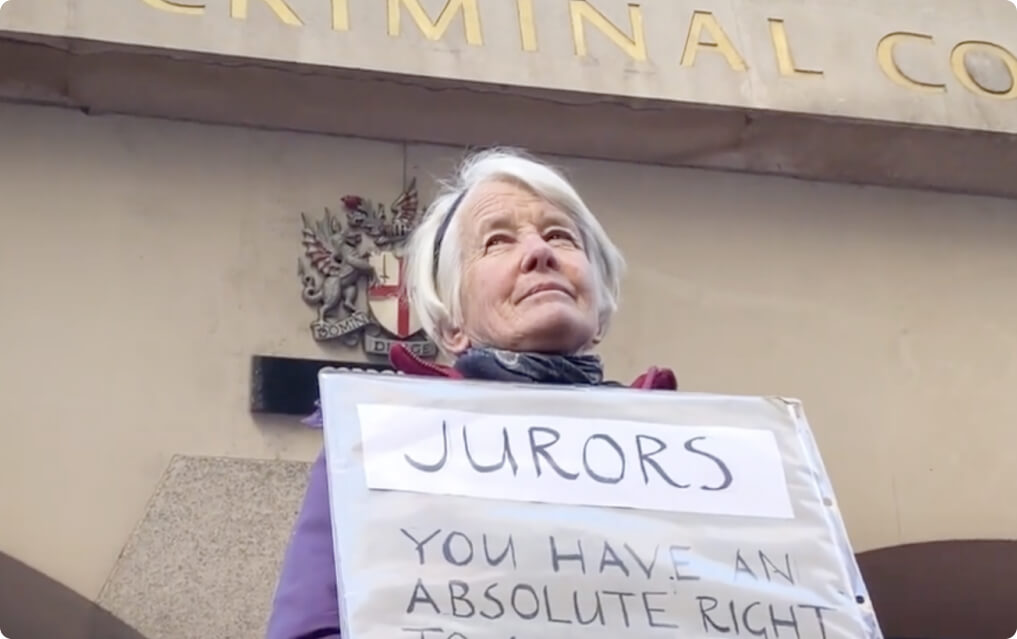Press release: 16 April 2024 High stakes as high court to hear government application to jail woman for holding a sign
- Solicitor General, Robert Courts MP, applies to commit Trudi Warner to prison, with permission hearing at the Royal Courts of Justice to take place on 18 April
- Outcome of application will have major implications for jury trial, free speech and democracy
- If Solicitor General’s application is successful hundreds more face imprisonment for replicating Trudi Warner’s action
- Top barrister, Clare Montgomery KC, to represent Trudi Warner

Unintended consequences?
When Trudi Warner, a retired social worker, held up a hand-written sign outside Inner London Crown Court on 27 March last year, she could hardly have imagined all that would follow. Arrest, an Old Bailey hearing, international press coverage, the birth of a movement. And now on Thursday, the High Court will hear the application of the Solicitor General, Robert Courts MP, for ‘permission’ to apply to commit Trudi Warner to prison. Whatever the outcome, the implications are profound.
The sign and its context
Following a pattern of jury acquittals of people taking direct action against climate breakdown, Judge Silas Reid, one of the judges at Inner London Crown Court, where many of these trials were taking place, decided that enough was enough. He issued a ruling banning defendants from referring to ‘climate change’ and ‘fuel poverty’ in his courtroom, knowing that both were central to explaining why defendants had felt compelled to take action. When David Nixon explained his motivation to the jury nonetheless, Judge Reid sent him to jail just for using those words. That was on 7 February 2023. And then on 3 March 2023, Judge Reid sent Amy Pritchard and Giovanna Lewis to prison, again just for using the words ‘climate change’ and ‘fuel poverty’ in court. It was a few weeks later on 27 March, that Trudi Warner upheld a sign communicating the long established principle of jury equity she had been taught as a child in school. The same principle that is commemorated on a marble plaque in the Old Bailey, where it can be seen by jurors and others.

Hundreds more prosecutions to follow?
If the arrest of Ms Warner were intended to have a deterrent effect, it’s not been going to plan. Hundreds of people have followed in her footsteps, holding the same sign outside Crown Courts around the country at the same time of day. On 4 December last year, more than 500 people held up the same sign, outside 50 courts across England and Wales. In February, this year, more than 300 people wrote to the Solicitor General inviting him to prosecute them too. If the Court grants the Solicitor General’s application on Thursday, the prospect opens up of all these others being prosecuted too, and potentially imprisoned, at vast public expense. Meanwhile British jails are so full, judges have been instructed not to pass prison sentences even for violent crimes.
If the Solicitor General prevails, there would also be a good case for prosecuting the administrators and judges of the Old Bailey, who have permitted the same principle to be seen by jurors for so long on the marble plaque, not to mention the judges of the Supreme Court, who have published a film about the principle of jury equity and the independence of juries (https://www.youtube.com/watch?v=IYzb3iAvwDk).
Implications for jury trial, free speech and democracy
Aside from the implications for Ms Warner and hundreds of others, it is the deeper implications for free speech and democracy that have attracted the attention of so many commentators in this country and around the world. Featuring the story of Trudi Warner, the Associated Press ran an article in December in World News, “The right to protest is under threat in Britain, undermining a pillar of democracy”, which was published around the world, from the US to India, Spain to Japan. Michel Forst, the UN Special Rapporteur for Environmental Defenders, under the legally binding Aarhus Convention, highlighted the rulings of Judge Reid in an extraordinary end of mission statement in January:
“I was … alarmed to learn that, in some recent cases, presiding judges have forbidden environmental defenders from explaining to the jury their motivation for participating in a given protest or from mentioning climate change at all.
It is very difficult to understand what could justify denying the jury the opportunity to hear the reason for the defendant’s action, and how a jury could reach a properly informed decision without hearing it, in particular at the time of environmental defenders’ peaceful but ever more urgent calls for the government to take pressing action for the climate.”
Will common sense prevail?
Against this background, one might expect the Solicitor General to be laughed out of court. In recent years, however, the Government has found staunch support from the courts in its so-called ‘crackdown on protest’, with the Court of Appeal removing a succession of defences that were previously available to those taking direct action against the continuing expansion of the fossil-fueled economy, and upholding substantial sentences of imprisonment for peaceful protest. So much so that questions are increasingly being asked about the influence of fossil fuel money on the justice system. Last year it emerged that City law firms have supported nearly £1.5 trillion in fossil fuel transactions since 2018, generating profits which permeate the system as a whole. Investigative journalism suggests it may be the fossil fuel companies themselves who are driving the crackdown on protest, via ‘think-tanks’ such as Policy Exchange.
Notes for editors
Press contact: 07795 316164
Email: info@defendourjuries.org
The case will be heard in the Royal Courts of Justice on 18 April (starting at either 10.00 or 10.30hrs). Aiden Eardley KC will appear for the Solicitor General. Clare Montgomery KC for Trudi Warner.
See also:
“Sending climate protesters to prison shows the law is an ass: A pensioner is facing two years in jail for holding a placard outside a court. Centuries of legal tradition are on her side” (Prospect, 12 April 2024)
“We are All Trudi Warner! Promoting the Rights of Jurors in the Twenty First Century” (The Barrister, September 2023)
“Protestors must be allowed to explain motives in court” (The Times, 13 March 2023)
“Activists jailed for seven weeks for defying ban on mentioning climate crisis”, (openDemocracy, 3 March 2023)
“The right to protest is under threat in Britain, undermining a pillar of democracy” (Associated Press, December 2023)
Report of UN Special Rapporteur, January 2024
About Defend our Juries:
Defend Our Juries has the following aims:
- to bring to public attention the programme to undermine trial by jury in the context of those taking action to expose government dishonesty and corporate greed
- to raise awareness of the vital constitutional safeguard that juries can acquit a defendant as a matter of conscience, irrespective of a judge’s direction that there is no available defence (a principle also known as ‘jury equity’ or ‘jury nullification‘)
- to ensure that all defendants have the opportunity to explain their actions when their liberty is at stake, including by explaining their motivations and beliefs.
